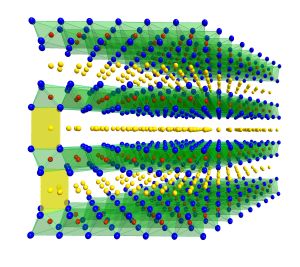
The new carbon-based material for sodium-ion batteries can be extracted from apples. Credit: KIT/HIU
A carbon-based active material produced from apple leftovers and a material of layered oxides might help reduce the costs of future energy storage systems. Both were found to have excellent electrochemical properties and stand for the environmentally compatible and sustainable use of resources. Sodium-ion batteries are not only far more powerful than nickel-metal hydride or lead acid accumulators, but also represent an alternative to lithium-ion technology, as the initial materials needed are highly abundant, accessible, and low cost. Hence, sodium-ion batteries are a very promising technology for stationary energy storage systems.

Schematic structure of the layered oxides produced. (Photo: KIT/HIU)
Now, the teams of Prof Passerini and Dr.Buchholz of Helmholtz Institute Ulm of Karlsruhe Institute of Technology have made an important step towards the development of active materials for sodium-based energy storage systems. For the negative electrode, a carbon-based material was developed, which can be produced from the leftovers of apples and possesses excellent electrochemical properties. So far, >1000 charge and discharge cycles of high cyclic stability and high capacity have been demonstrated.
The positive electrode consists of several layers of sodium oxides. This active material goes without the expensive and environmentally hazardous element cobalt that is frequently used in active materials of commercial lithium-ion batteries. At the lab, the new active material, in which electrochemical energy storage proper takes place, reaches the same efficiency, cyclic stability, capacity, and voltage without any cobalt. Both materials mark an important step towards the development of inexpensive and environmentally friendly sodium-ion batteries. http://www.kit.edu/kit/english/pi_2016_007_organic-waste-for-sustainable-batteries.php








Recent Comments